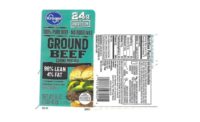Good Food Concepts LLC, a Colorado Springs, Colo. establishment, is recalling approximately 1,290 pounds of raw intact and non-intact beef because the products may be contaminated with E. coli O26, the U.S. Department of Agriculture’s Food Safety and Inspection Service (FSIS) announced.
The raw intact and non-intact beef items were processed and packaged on Aug. 3 and Aug. 4, 2017. The following products are subject to recall:
- Various weights of individual packages of “CALLICRATE BEEF, Celebrate goodness, Celebrate life, Filet Mignon,” with lot code 170731CC.
- Various weights of individual packages of “CALLICRATE BEEF, Celebrate goodness, Celebrate life, Brisket Flat,” with lot code 170731CC.
- Various weights of individual packages of “CALLICRATE BEEF, Celebrate goodness, Celebrate life, Sirloin Tip,” with lot code 170731CC.
- Various weights of individual packages of “CALLICRATE BEEF, Celebrate goodness, Celebrate life, Ribeye,” with lot code 170731CC.
- Various weights of individual packages of “CALLICRATE BEEF, Celebrate goodness, Celebrate life, Stew Meat,” with lot code 170731CC.
- Various weights of individual packages of “CALLICRATE BEEF, Celebrate goodness, Celebrate life, New York Strip,” with lot code 170731CC.
- Various weights of individual packages of “CALLICRATE BEEF, Celebrate goodness, Celebrate life, Skirt Steak,” with lot code 170731CC.
- Various weights of individual packages of “CALLICRATE BEEF, Celebrate goodness, Celebrate life, Top Sirloin,” with lot code 170731CC.
The products subject to recall bear establishment number “EST. 27316” inside the USDA mark of inspection. These items were shipped to retail locations, wholesale locations, and restaurants in Colorado Springs, Colorado.
The problem was discovered on Aug. 5, 2017 when plant management at Good Food Concepts, LLC notified FSIS in-plant inspection personnel that they tested a production lot of carcasses they received from the Callicrate Ranch on July 31, 2017. The carcass trimmings from the N60 analysis was positive for E. coli O26 and non-O157.
Many clinical laboratories do not test for non-O157 Shiga toxin-producing E. coli (STEC), such as STEC O26 because it is harder to identify than STEC O157. FSIS and the company are concerned that some product may be frozen and in consumers' freezers. Consumers who have purchased these products are urged not to consume them.
Source: FSIS




